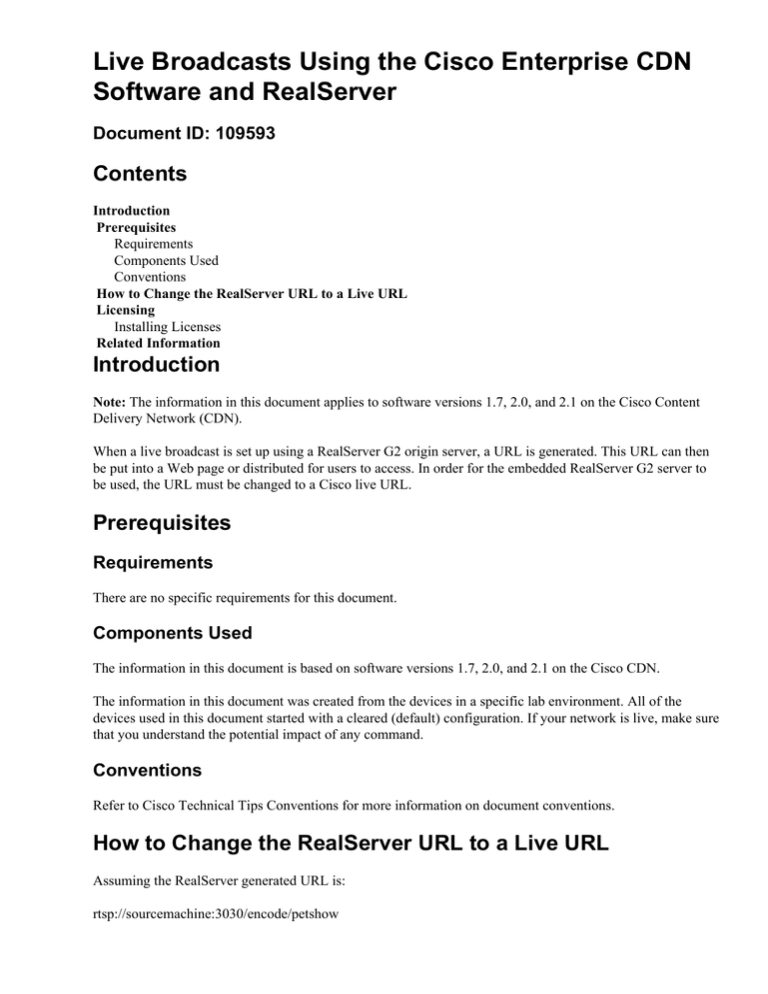
Live Broadcasts Using the Cisco Enterprise CDN
Software and RealServer
Document ID: 109593
Contents
Introduction
Prerequisites
Requirements
Components Used
Conventions
How to Change the RealServer URL to a Live URL
Licensing
Installing Licenses
Related Information
Introduction
Note: The information in this document applies to software versions 1.7, 2.0, and 2.1 on the Cisco Content
Delivery Network (CDN).
When a live broadcast is set up using a RealServer G2 origin server, a URL is generated. This URL can then
be put into a Web page or distributed for users to access. In order for the embedded RealServer G2 server to
be used, the URL must be changed to a Cisco live URL.
Prerequisites
Requirements
There are no specific requirements for this document.
Components Used
The information in this document is based on software versions 1.7, 2.0, and 2.1 on the Cisco CDN.
The information in this document was created from the devices in a specific lab environment. All of the
devices used in this document started with a cleared (default) configuration. If your network is live, make sure
that you understand the potential impact of any command.
Conventions
Refer to Cisco Technical Tips Conventions for more information on document conventions.
How to Change the RealServer URL to a Live URL
Assuming the RealServer generated URL is:
rtsp://sourcemachine:3030/encode/petshow
Then the live URL would be:
http://hostname/sightpath/PetShop/Dogs/RealLive/sourcemachine:3030/encode/petshow
where:
• host name = Cisco Content Distribution Manager (CDM) dns name
• sigthtpath = script entry point
• PetShop/Dogs = CDM name/channel name
• RealLive = syntax indicating used for Real Live Pull Streaming
Once this URL has been edited, published, and selected, you are connected to a live broadcast, using a
Content Engine (CE) as a RealServer G2 splitter. This process works as follows:
1. Selecting the URL sends a request to the CDM (indicated by the host name, in this case).
2. The CDM uses its standard replica routing to determine the best media CE to redirect the request to
using the network address of the end−user.
3. The CDM redirects the URL to the best media CE; the CE then interprets the URL to be a RealServer
live event.
4. Once the CE determines that it is a RealServer live event, then the origin server decodes the URL
back to the original live URL and the splitter is set up. You may have to wait up to 30 seconds for this
to be accomplished.
5. The CE then streams the live event to the end−user.
6. When additional users request the same live event, the same redirection process takes place, and the
end−user then joins the stream on the local LAN.
Licensing
Each Cisco CDM ships with a single 10−stream Client Access License (CAL) with limited functionality to be
used on one CE associated with the CDM. This CAL enables the user to try out the RealNetworks
functionality before purchasing full−functionality CALs that meet the end−users' complete needs. CALs can
be purchased from Cisco, or directly through RealNetworks.
Installing Licenses
CAL files are installed on CEs using a floppy at system boot−up. In order to install CALs, complete these
steps:
1. Create a directory called license on a standard PC floppy.
2. Copy all necessary CALs into the license directory. All licenses that need to reside on the CE must be
on the floppy since the license directory on the floppy overwrites the directory of the same name on
the CE. If there is an existing CAL on the CE that is not included on the floppy, it will be deleted
upon installation of the new CAL set. All CALs can be deleted using the floppy with an empty license
folder.
3. Boot the CE.
4. When you hear the CE access the floppy drive (while empty), insert the floppy into the drive.
5. Once the system has booted (approximately 10 minutes), the CALs are installed.
6. Remove the floppy and keep it in a safe place in case there is a need to reinstall the CALs.
For more information on how to use licenses in CDN versions 2.0 and 2.1, refer to these release notes.
Related Information
• Release Notes for the Cisco CDN Software Enterprise Edition Version 2.1
• Cisco Application Networking Services
• Cisco Enterprise CDN Software
• Cisco Content Engine
• Technical Support & Documentation − Cisco Systems
Contacts & Feedback | Help | Site Map
© 2013 − 2014 Cisco Systems, Inc. All rights reserved. Terms & Conditions | Privacy Statement | Cookie Policy | Trademarks of
Cisco Systems, Inc.
Updated: Feb 11, 2009
Document ID: 109593

